Storm Ciarán: Flooding and damage hits homes across UK
Communities across the British Isles are reeling after Storm Ciarán battered homes and businesses.
There is widespread flooding and damage around the UK, with thousands of homes left without power, hundreds of schools closed and major travel disruption.
Southern England and the Channel Islands have been worst-hit by Ciarán, with 80 flood warnings still in place across England.
No UK deaths have so far been linked to the rain and 100mph (161km/h) gusts.
But countless homes around the country have been severely damaged - with some residents even believing they have been hit by tornadoes - and many still assessing the full scale of the destruction. It follows a series of other flooding incidents in recent weeks.
One yellow weather warning for rain remains in place until Friday evening in eastern Scotland, with the rest of the country no longer covered by any other weather warnings.
More than 200 flood alerts have been issued for England, alongside the 86 flood warnings where flooding is expected, but there are currently no severe flood warnings - the highest category - in place.
Dozens of people in Jersey were evacuated to hotels overnight on Wednesday after gusts of up to 102mph (164km/h) were recorded. Locals were also hit by huge hailstones "bigger than golf balls".
In St Clement, Sharon Mackie Marquer filmed video showing the destruction around her home, with roof tiles littering her garden and the fence knocked over. Cars smashed up by debris and overturned tables can also be seen.
A clip from the same Jersey parish showed Jessica O'Reilly sleeping in bed alongside her baby when the sound of the 'weather bomb' woke her - seconds before the window was blown inwards.
She described the moment her "motherly instinct" kicked in, telling the BBC: "We went up to bed and could hear the wind getting stronger and stronger, closer and closer.
"Something didn't seem right, then the windows just smashed in, I grabbed [my daughter] and got out the room.
"I think I just thought 'my baby's in danger, I need to get out' and ran down the stairs."
'Scene from a disaster movie'
She added that her house is not habitable as there is still glass everywhere, and they are having to stay in a hotel - but despite the shock, there was "not a scratch" on mother or baby.
St Helier-based Carl Walker, the chairman of Jersey's Consumer Council, said his family were woken by hailstones at midnight, which he said had stuck together to create "golf ball-sized lumps of ice".
He explained: "We camped out in our living room downstairs with our children because it was just simply too noisy and too frightening to be upstairs in the bedrooms - tiles were lifting, debris was hitting the roof, windows were flexing.
"The noise of the wind was just incredible and quite frightening. It was like a scene from a disaster movie."
Mags Balston, who is in her 80s and has lived in her house in Jersey for 21 years, told the BBC that she is still in shock after spending the night in her kitchen after the windows blew in.
She recalls "a sudden explosion like a bomb had gone off" but wants to stay in her home as she does not want to move the cat.
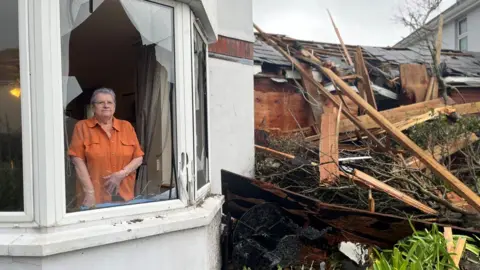
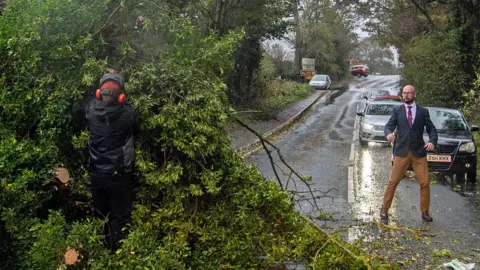 Stuart Brock/EPA-EFE/REX/Shutterstock
Stuart Brock/EPA-EFE/REX/Shutterstock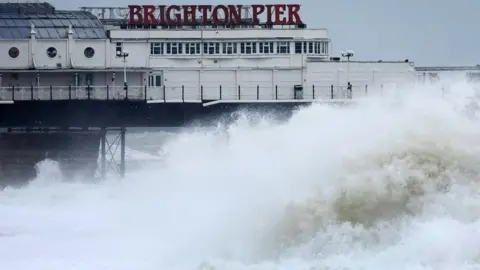 ANDY RAIN/EPA-EFE/REX/Shutterstock
ANDY RAIN/EPA-EFE/REX/Shutterstock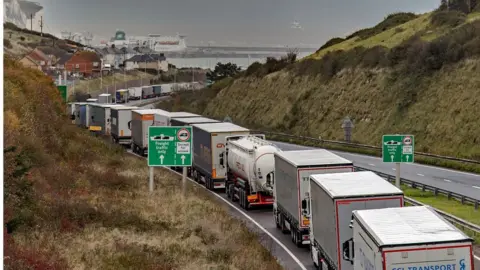 Stuart Brock/EPA-EFE/REX/Shutterstock
Stuart Brock/EPA-EFE/REX/Shutterstock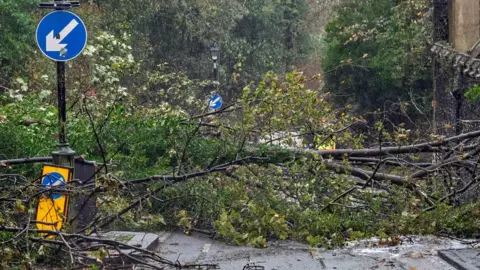 Stuart Brock/EPA-EFE/REX/Shutterstock
Stuart Brock/EPA-EFE/REX/ShutterstockElsewhere across the British Isles, roofs have been blown off, some train lines have completely ground to a halt and there were long queues around the Port of Dover, which shut earlier amid rough seas.
Some train companies had asked commuters to work from home ahead of major disruption to lines in southern England and Scotland.
South Western Railway was among the rail providers impacted and said services across the whole network may be cancelled, delayed or revised - with disruptions expected until the end of Thursday.
The storm caused chaos for drivers too, and the AA, which had a large number of callouts in southern England, said it had rescued 84 customers stuck in floods so far on Thursday. One driver caught in flood water was being treated for hypothermia, it added.
There was also significant disruption at airports, with all flights from Jersey, Guernsey and Alderney cancelled on Thursday.
In Northern Ireland, which is experiencing flooding following heavy rain and weather warnings earlier this week, one assembly member branded the scenes in County Down "apocalyptic", with flood waters "decimating" local businesses.
In France, where 1.2 million people were reported to be without electricity, a lorry driver was killed after being struck by a falling tree. Spain, Belgium and the Netherlands have also been badly hit.
Around 9,000 homes across Devon and Cornwall, Sussex, Surrey and the Channel Islands were left without power earlier today.
Emergency services said earlier an unoccupied vehicle which washed off a promenade in Devon on Wednesday night will remain on a beach until it is safe to recover it.
In Falmouth, student Kate Marsh told the BBC she was woken at 05:30 GMT when the roof of her bedroom entirely blew off and collapsed onto her.
Aaron Waterer had a similar experience in his motorhome in Broadstairs, Kent.
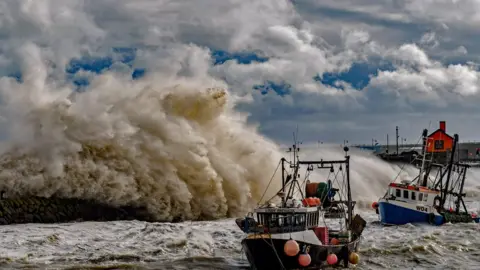 Stuart Brock/EPA-EFE/REX/Shutterstock
Stuart Brock/EPA-EFE/REX/Shutterstock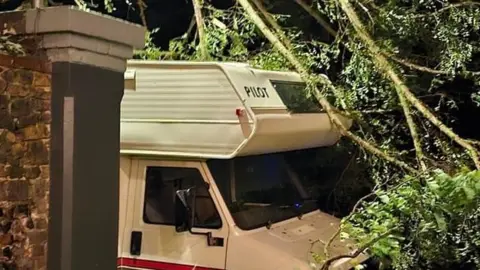 Aaron Waterer
Aaron Waterer Aaron Waterer
Aaron Waterer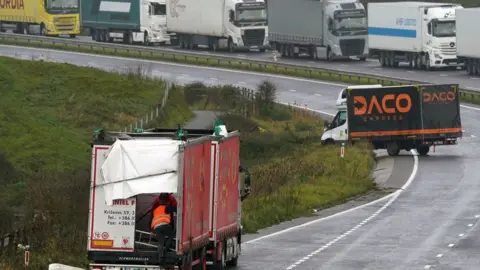 PA Media
PA MediaA large tree branch was ripped off in strong winds and pierced the roof - ending up just centimetres above his mattress.
But 47-year-old Mr Waterer was out of bed getting a drink of water at the time of the incident, around 02:00 GMT.
"My nerves were all shot", he said.
"I just didn't know what to do, it was just shock. I still don't think it has sunk in that much, it's just bizarre."
In south Wales, a caravan park was evacuated following a risk to life warning, with "the majority" of the Kiln Park site underwater. One man was pictured kayaking through the area.
In Dorset, firefighters evacuated 70 people from 198 caravans at Freshwater Holiday Park in Burton Bradstock, near Bridport, with some being taken to dry land by boat.
Many children remained at home across the country, as more than 300 schools closed in southern England, mainly in Devon.
Albourne School in Hassocks, West Sussex, closed after it was struck by lightning, lost power and was flooded.
The Government of Jersey said schools will close for a second day on Friday, as they aim to get pupils back in classrooms on Monday.
Elizabeth Rizzini, from BBC Weather, said many coastal areas had been exposed to dangerously large waves.
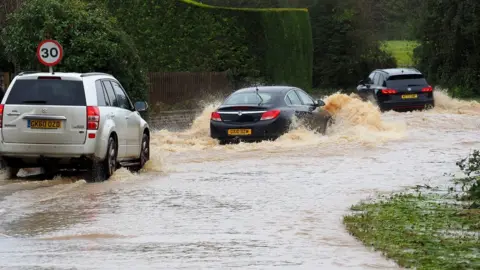 PA Media
PA Media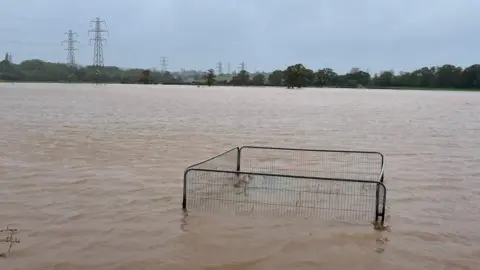 PA Media
PA Media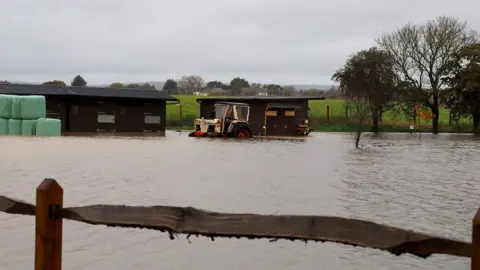 PA Media
PA Media"The wind gusts have now peaked... winds will ease as we head through the rest of (Thursday) as the storm pulls out into the North Sea", she explained.
But Ms Rizzini warned some gusts of 60-65mph (97-105km/h) could still be expected along the coast, particularly in eastern areas.
She added: "We are going to see more heavy rain, another 40 to 60mm perhaps over the higher ground of the Pennines."
Strong winds and rain are expected overnight in north-east England and northern Scotland, but Friday is forecast to be calmer.
Storm Ciarán is the third named storm of the year, after Babet caused significant flooding to thousands of homes a fortnight ago, and Agnes struck in late September.
BBC Weather's Matt Taylor confirmed that Ciarán has been classified as a weather bomb, or 'explosive cyclogenesis'.
He explained that meteorologists use the term for a storm "that appears to intensify rapidly, with its central air pressure dropping by at least 24 millibars (mb) in 24 hours."
Experts say a warming atmosphere increases the chance of intense rainfall and storms.
However, many factors contribute to extreme weather and it takes time for scientists to calculate how much impact climate change has had on particular events - if any.
The world has already warmed by about 1.1C since the industrial era began and temperatures will keep rising unless governments around the world make steep cuts to emissions.
Additional reporting by Sean Seddon.
